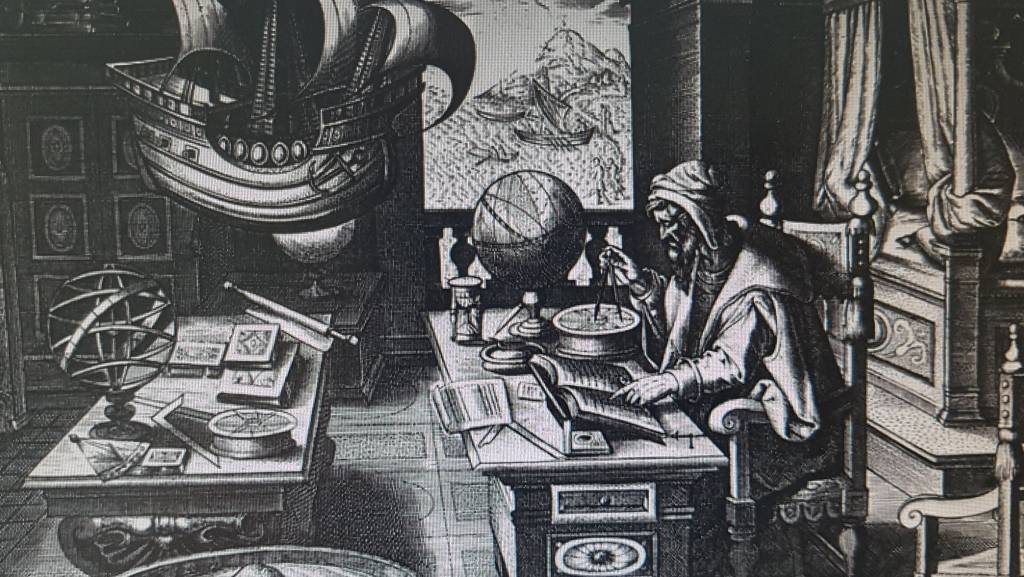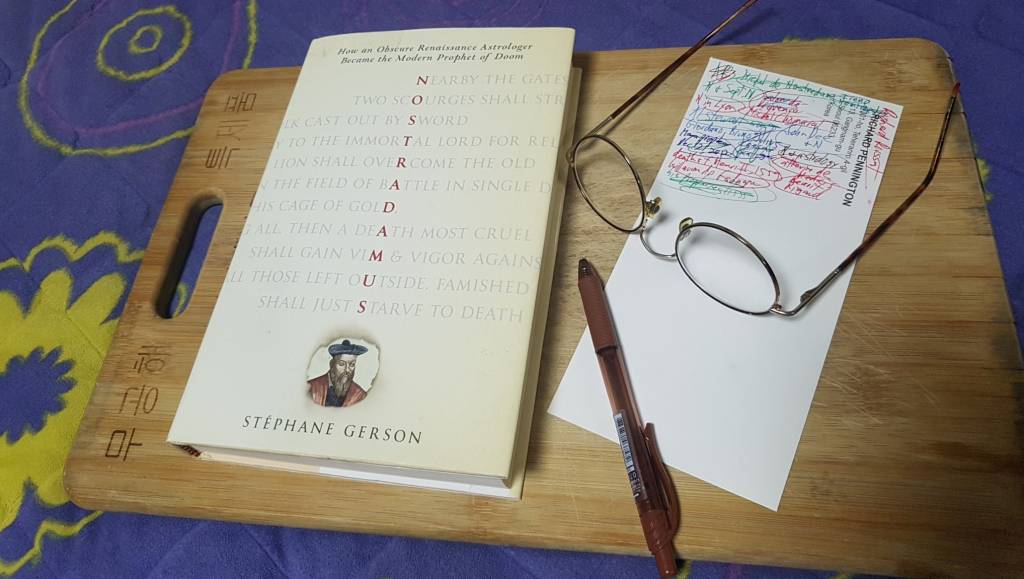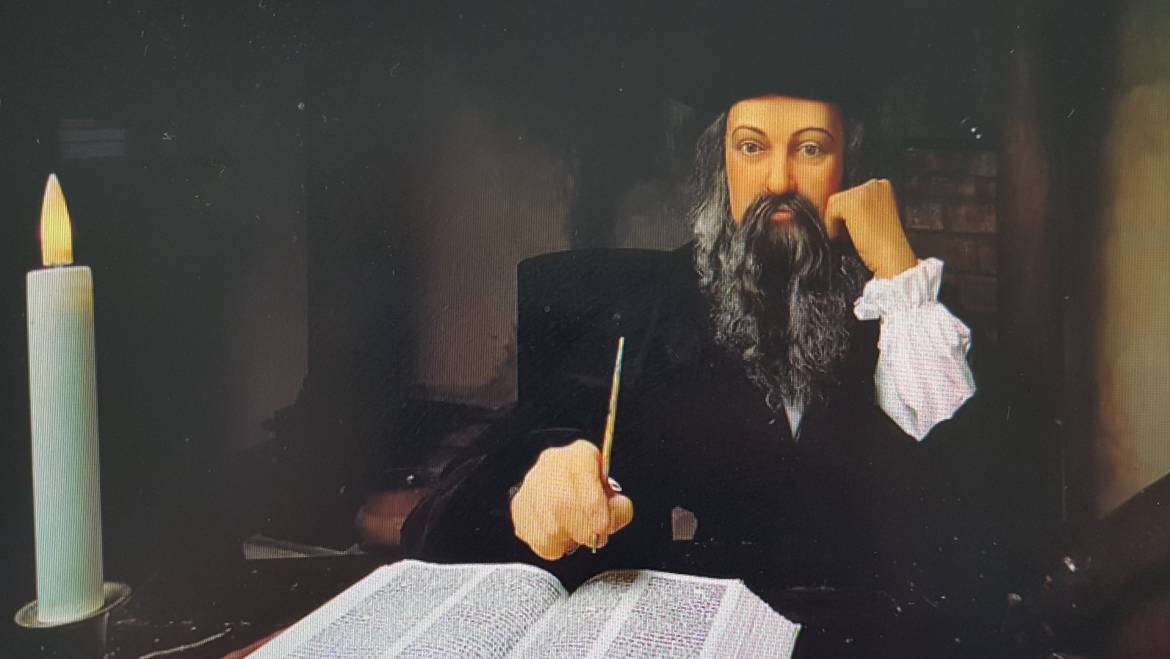During my final semester as a college student—fall 1975 at Stephen F. Austin State University—a friend named Andy introduced me to a rather soaring tune by British rocker Al Stewart. It was about physician, astrologer and purported seer Nostradamus (1503–1566). Stewart devoted 9 minutes and 43 seconds of side two of his album Past, Present and Future to “Nostradamus.” He sang of Nostradamus’ uncanny ability to predict the future. These two lines are part of the oft-repeated chorus:
Man, man, your time is sand, your ways are leaves upon the sea.
I am the eyes of Nostradamus, all your ways are known to me.
Stewart had chosen to base his verses on Erika Cheetham’s controversial if not fawning book, The Prophecies of Nostradamus / The Man Who Saw Tomorrow, published in 1965. Andy, also an SFA student, was more impressionable than I. He insisted that Nostradamus had foreseen numerous major events, and appeared willing to accept it all at face value. I told him I would have to withhold judgment for the time being. Not until January 2022 did I finally take a look at the writings of this Frenchman whose name is synonymous with “clairvoyant.” I did so in the form of Nostradamus / How an Obscure Renaissance Astrologer Became the Modern Prophet of Doom by Stéphane Gerson. He strove for more objectivity than Cheetham, but only by degree.
First, a short biography of the man. He was born Michel de Nostradame (Michael of Our Lady, Latinized to Nostradamus). Derived from a family of Jewish converts, as a child he was said to have been influenced by Jewish occult literature such as Kabbalah. The apocalyptic Book of Revelation also seemed to hold him in thrall. Nostradamus studied at Avignon and Montpellier, earning a medical degree. He appears to have labored heroically in the fight against the bubonic plague—it took his first wife and two children—which afforded him a reputation as an enlightened healer.
Somewhere in the late 1540s, however, he transitioned away from medicine to the occult. He started, innocently enough, with almanacs. Farmers always want to know about the weather, right? Nostradamus claimed to have inside information as to the likelihood of rain or drought and soon moved to floods, famines and earthquakes, and on to political upheaval—from the mundane to the dramatic. He did so by studying historical records, astronomical data such as lunar cycles and movement of the stars and planets. Self-trained as an astrologist, he was fiercely criticized by a colleague named Laurens Videl.
Nostradamus ignored Videl, but he paid a bit more attention to the agents of the Inquisition who had not yet faded from the scene. He cagily emphasized that he was not a prophet and he was not prophesying, and yet what was the title of his most famous book? The Prophecies! Published between 1555 and 1558, they are the main source of his enduring fame. He was also protected by his relationship with Catherine de Medici, wife of King Henri II. She thought Nostradamus was the cat’s meow and once summoned him to Paris to explain his writings in more detail and to provide horoscopes for the royal children.
He is said to have done his esoteric work at night, focusing intensely on fire and water; he may also have partaken of mild hallucinogens like nutmeg. When pressed, he claimed that an “angelic spirit” helped him see and then put it all down on paper. This he did in the form of quatrains—4-lined verses in groups of 100. They are loaded with abstractions, metaphors, anagrams and depictions of one catastrophe after another. Critics say his writings are intentionally vague, ambiguous and open to creative interpretation.
Gout, which had bothered Nostradamus for years, finally killed him on July 1, 1566. He was buried at the Franciscan chapel in Salon-de-Provence, France. Almost as soon as he was laid to rest, he became the subject of numerous apocryphal legends. Etienne Jaubert (1656), Balthasar Guynaud (1693) and Eugene Bareste (1840) are among the people who contributed to modern fallacies about “the master.”
There is widespread debate about just what he wrote, apart from its meaning. But a short list of future people and events Nostradamus allegedly referenced would include the Great Fire of London; the execution of King Charles I of England; the French Revolution; the rise of Napoleon, Hitler and Franco; the American Civil War; World Wars I and II; the atomic bombing of Hiroshima and Nagasaki; the Kennedy brothers; the Apollo moon landings; the Space Shuttle disaster; the fall of the Berlin Wall; the death of Princess Diana; the Mohammedan terrorist attacks of September 11, 2001; and the Covid-19 pandemic. Some people who believe this stuff say he predicted that the world will come to an end in 3797.
While admitting that Nostradamus was a fascinating person, I am among the skeptics. Since there is no way he could or did predict things centuries in the future, why even talk about it? These claims have been—in my view—thoroughly debunked, rebutted and proven false. Nostradamus’ private correspondence was published in 1983, and scholars have unearthed other archival material. They say, in almost complete unanimity, that he was misquoted or misinterpreted in every case. And when he did make prognostications, they were off the mark. Modern-day supporters are guilty of fitting his words to events that have already occurred, a process known as “retroactive clairvoyance.” Vague imageries in The Prophecies have been used as so-called proof that events were foretold long ago. Stéphane Gerson, author of the book I read, traces Nostradamus’ lasting appeal to the ways his arcane predictions can mean virtually anything. (I could, for example, predict that a three-legged dog will be born, without specifying when or where or what breed. Sooner or later, it’s bound to happen. And when it does, I hope I get the recognition I deserve.)
Don’t feel bad, Nostradamus. Please don’t take it personally. I also have profound doubts about the Delphic Oracle, Sybil, Emmanuel Swedenborg, William Blake, Rudolf Steiner, Edgar Cayce, Jean Dixon, Baba Vanga and countless others who over the centuries have claimed to be able to see the future.
#nostradamus #alstewart #sfasu #theprophecies




2 Comments
I have never been a follower of Nostradamus. Baa humbug!
Really…seems so shallow and stupid.
Add Comment